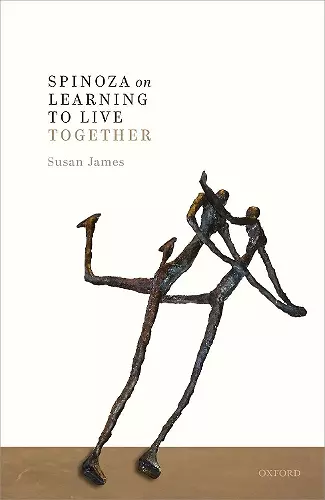Spinoza on Learning to Live Together
Format:Hardback
Publisher:Oxford University Press
Published:22nd Oct '20
Currently unavailable, and unfortunately no date known when it will be back

Philosophising, as Spinoza conceives it, is the project of learning to live joyfully. Yet this is also a matter of learning to live together, and the surest manifestation of philosophical insight is the capacity to sustain a harmonious way of life. Here, Susan James defends this overall interpretation of Spinoza's philosophy and explores its bearing on contemporary philosophical debates around issues such as religious toleration, putting our knowledge to work, and the environmental crisis. Part I focuses on Spinoza's epistemology. Philosophical understanding empowers us by giving us access to truths about ourselves and the world, and by motivating us to act on them. It gives us reasons for living together and enhances our ability to live co-operatively. Part II takes up Spinoza's claim that, to cultivate this kind of understanding, we need to live together in political communities. It explores his analysis of how states can develop a co-operative ethos. Finally, living joyfully compels us to look beyond the state to our relationship with the rest of nature. James concludes with discussions of some of the virtues this requires.
one looking for an account of Spinoza's views on the ethics of ordinary life could hardly ask for a better guide than Susan James. Spinoza on Learning to Live Together makes the case for regarding Spinoza, for all of his rarefied intellectualism, as a theorist who is deeply attuned to the challenges to, and importance of, living cooperatively with others. * Justin Steinberg, Notre Dame Philosophical Reviews *
James's volume has much to add to our understanding of Spinoza's ethics, politics, and their interconnection, and will be an indispensable volume for scholars and casual readers of Spinoza alike. * Hadley Marie Cooney, Central Michigan University, Journal of the History of Philosophy *
The essays are informed by deep scholarship, but the exemplary clarity and elegance of their composition make this volume an excellent introduction to Spinoza for those new to philosophy. Summing Up: Essential. Lower-division undergraduates through faculty; general readers. * M. Latzer, CHOICE *
This is a wonderful collection of essays. They offer sophisticated and unexpected insights into aspects of Spinoza's philosophical system—and especially the unity of that system in its metaphysical, epistemological, moral, and political dimensions—that have largely been unexplored by scholars. . . . James is an astute political thinker in her own right, and her commentaries on Spinoza's political, religious, and ethical views are of general philosophical interest. Moreover, James is an elegant writer, and these essays are a pleasure to read. It is a great benefit to have them published together in one place. * Steven Nadler, European Journal of Philosophy *
ISBN: 9780198713074
Dimensions: 238mm x 162mm x 19mm
Weight: 486g
240 pages